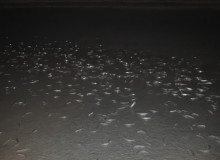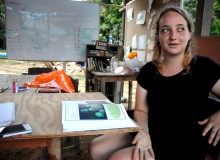Search
SUNY-ESF
Friday, March 09, 2018
Indigenous peoples are going to pave the way for a new system that honors the diverse ecosystems of the world as partners in economic and cultural well-being.
Tags: Indigenous Science, Indigenous Knowledge, Native Science, Native Knowledge, Indigenous, science, sustainable, storyfest2018
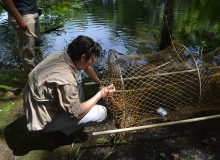
Kevin Fouts unties a turtle trap to show a common snapping turtle to a group of high school students in July 2018. (Vanessa Moss/Sewanee)
Planet Forward Correspondent | Sewanee: The University of the South
Thursday, February 28, 2019
The coordinator for the Sewanee Headwaters Initiative, Kevin Fouts, shares insights about the connection between water management practices and their impacts.
Tags: biology, ecology, streams, waterways, watershed, pollutants, Biodiversity, pfcorrespondent
SUNY ESF
Sunday, March 03, 2019
Without the field, science communication, science would cease to exist the second a scientist left the laboratory. If the found data cannot be synthesized in a manner that people can understand, what is the point of doing the research?
Tags: science communication, politics, science
Planet Forward Senior Correspondent
Monday, April 27, 2020
Environmentalism is a relatively recent concept in the Western world, creating challenges when confronting our growing environmental issues. Looking to other, non-western cultures and leaders, may help develop enduring solutions.
Tags: native, environmentalism, Earth Day, fad, conservation, solution, leadership, opinion
Planet Forward Correspondent | University of San Diego
Monday, March 29, 2021
Correspondent Maggie Scholle observes a grunion run, a seasonal phenomenon of fish spawning that lines the Southern California coast.
Tags: oceans, Marine Ecology, shoreline, storyfest2021, sustainable fishing
Northwestern University
Thursday, April 27, 2017
One culinary intern at Kalu Yala used her time in Panama to improve her personal relationship with food and to get an example of a sustainable food system that contrasts the American food system.
Tags: food, Farm To Table, Garden, ecological agriculture, agriculture
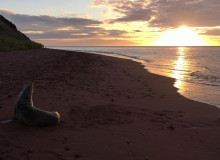
The Galapagos islands are home to many plants and animals, both terrestrial and aquatic, that are found nowhere else in the world. (Henry Becker/George Washington University)
George Washington University
Thursday, October 03, 2019
Next in our Galápagos series, GW's Henry Becker discusses invasive species eradication programs — both the successes and their pitfalls — and explores the controversial topic of biological control.
Tags: galapagos2019, Biodiversity, invasive species, Invasives, environmental science, Indigenous Science
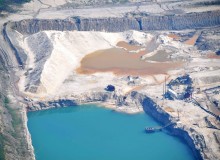
Northern White Sand mine, North Utica, Illinois. Aerial images taken with the assistance of the non-profit pilot collaborative LightHawk. (Ted Auch/FracTracker Alliance, June 2016)
Northwestern University
Monday, November 27, 2017
Farmers in Illinois are fighting in an ongoing lawsuit to stop a proposed sand mine that would be built close to their land.
Tags: lawsuit, lasalle county, agriculture, water conservation, sand mining, fracking
Biology student Selah Phillips collects algae at the Pacora River. She hopes the oil she has extracted from the algae can be processed into sustainable biodiesel. (Maddie Burakoff/Medill)
Northwestern University
Friday, June 29, 2018
Maddie Burakoff of Medill reports that at eco-institute Kalu Yala, researchers seek out environmental solutions in the midst of one of the most biodiverse regions in the world, but grapple with sustaining their own progress.
Tags: kalu yala, panama, Ryan King, Selah Phillips, Jules Hart, Tara McLaughlin, algae, Black soldier flies, Medill, Maddie Burakoff
Columbia University
Friday, April 02, 2021
The pandemic should be a golden opportunity to change the way we think about mental illness. So far, it hasn’t been.

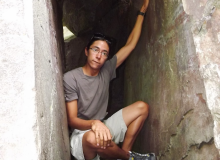

.jpg%3Fitok=FGmjArxb)
